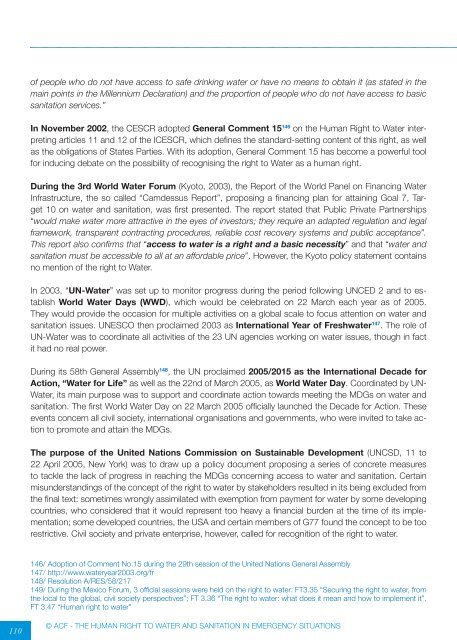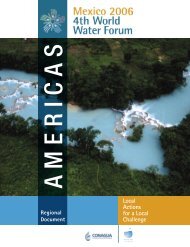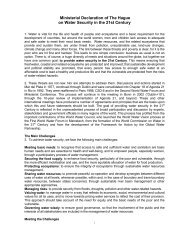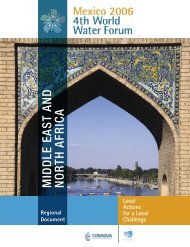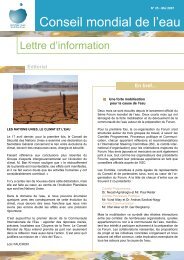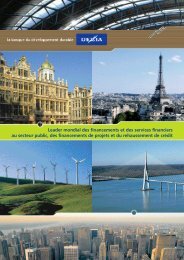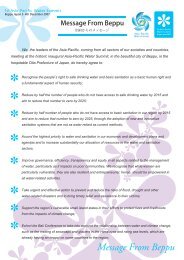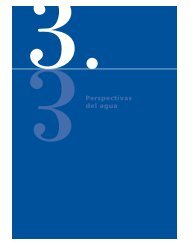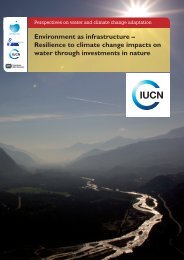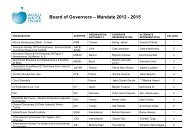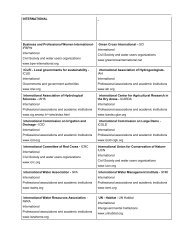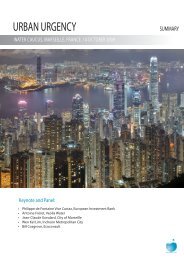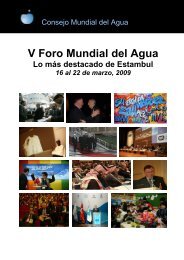the human right to water and sanitation in emergency situations
the human right to water and sanitation in emergency situations
the human right to water and sanitation in emergency situations
You also want an ePaper? Increase the reach of your titles
YUMPU automatically turns print PDFs into web optimized ePapers that Google loves.
110<br />
of people who do not have access <strong>to</strong> safe dr<strong>in</strong>k<strong>in</strong>g <strong>water</strong> or have no means <strong>to</strong> obta<strong>in</strong> it (as stated <strong>in</strong> <strong>the</strong><br />
ma<strong>in</strong> po<strong>in</strong>ts <strong>in</strong> <strong>the</strong> Millennium Declaration) <strong>and</strong> <strong>the</strong> proportion of people who do not have access <strong>to</strong> basic<br />
<strong>sanitation</strong> services.”<br />
In november 2002, <strong>the</strong> CESCR adopted General Comment 15 146 on <strong>the</strong> Human Right <strong>to</strong> Water <strong>in</strong>terpret<strong>in</strong>g<br />
articles 11 <strong>and</strong> 12 of <strong>the</strong> ICESCR, which def<strong>in</strong>es <strong>the</strong> st<strong>and</strong>ard-sett<strong>in</strong>g content of this <strong>right</strong>, as well<br />
as <strong>the</strong> obligations of States Parties. With its adoption, General Comment 15 has become a powerful <strong>to</strong>ol<br />
for <strong>in</strong>duc<strong>in</strong>g debate on <strong>the</strong> possibility of recognis<strong>in</strong>g <strong>the</strong> <strong>right</strong> <strong>to</strong> Water as a <strong>human</strong> <strong>right</strong>.<br />
Dur<strong>in</strong>g <strong>the</strong> 3rd World Water Forum (Kyo<strong>to</strong>, 2003), <strong>the</strong> Report of <strong>the</strong> World Panel on F<strong>in</strong>anc<strong>in</strong>g Water<br />
Infrastructure, <strong>the</strong> so called “Camdessus Report”, propos<strong>in</strong>g a f<strong>in</strong>anc<strong>in</strong>g plan for atta<strong>in</strong><strong>in</strong>g Goal 7, Target<br />
10 on <strong>water</strong> <strong>and</strong> <strong>sanitation</strong>, was first presented. The report stated that Public Private Partnerships<br />
“would make <strong>water</strong> more attractive <strong>in</strong> <strong>the</strong> eyes of <strong>in</strong>ves<strong>to</strong>rs; <strong>the</strong>y require an adapted regulation <strong>and</strong> legal<br />
framework, transparent contract<strong>in</strong>g procedures, reliable cost recovery systems <strong>and</strong> public acceptance”.<br />
This report also confirms that “access <strong>to</strong> <strong>water</strong> is a <strong>right</strong> <strong>and</strong> a basic necessity” <strong>and</strong> that “<strong>water</strong> <strong>and</strong><br />
<strong>sanitation</strong> must be accessible <strong>to</strong> all at an affordable price”. However, <strong>the</strong> Kyo<strong>to</strong> policy statement conta<strong>in</strong>s<br />
no mention of <strong>the</strong> <strong>right</strong> <strong>to</strong> Water.<br />
In 2003, “un-Water” was set up <strong>to</strong> moni<strong>to</strong>r progress dur<strong>in</strong>g <strong>the</strong> period follow<strong>in</strong>g UNCED 2 <strong>and</strong> <strong>to</strong> establish<br />
World Water Days (WWD), which would be celebrated on 22 March each year as of 2005.<br />
They would provide <strong>the</strong> occasion for multiple activities on a global scale <strong>to</strong> focus attention on <strong>water</strong> <strong>and</strong><br />
<strong>sanitation</strong> issues. UNESCO <strong>the</strong>n proclaimed 2003 as International Year of Fresh<strong>water</strong> 147 . The role of<br />
UN-Water was <strong>to</strong> coord<strong>in</strong>ate all activities of <strong>the</strong> 23 UN agencies work<strong>in</strong>g on <strong>water</strong> issues, though <strong>in</strong> fact<br />
it had no real power.<br />
Dur<strong>in</strong>g its 58th General Assembly 148 , <strong>the</strong> UN proclaimed 2005/2015 as <strong>the</strong> International Decade for<br />
Action, “Water for Life” as well as <strong>the</strong> 22nd of March 2005, as World Water Day. Coord<strong>in</strong>ated by UN-<br />
Water, its ma<strong>in</strong> purpose was <strong>to</strong> support <strong>and</strong> coord<strong>in</strong>ate action <strong>to</strong>wards meet<strong>in</strong>g <strong>the</strong> MDGs on <strong>water</strong> <strong>and</strong><br />
<strong>sanitation</strong>. The first World Water Day on 22 March 2005 officially launched <strong>the</strong> Decade for Action. These<br />
events concern all civil society, <strong>in</strong>ternational organisations <strong>and</strong> governments, who were <strong>in</strong>vited <strong>to</strong> take action<br />
<strong>to</strong> promote <strong>and</strong> atta<strong>in</strong> <strong>the</strong> MDGs.<br />
The purpose of <strong>the</strong> united nations Commission on Susta<strong>in</strong>able Development (UNCSD, 11 <strong>to</strong><br />
22 April 2005, New York) was <strong>to</strong> draw up a policy document propos<strong>in</strong>g a series of concrete measures<br />
<strong>to</strong> tackle <strong>the</strong> lack of progress <strong>in</strong> reach<strong>in</strong>g <strong>the</strong> MDGs concern<strong>in</strong>g access <strong>to</strong> <strong>water</strong> <strong>and</strong> <strong>sanitation</strong>. Certa<strong>in</strong><br />
misunderst<strong>and</strong><strong>in</strong>gs of <strong>the</strong> concept of <strong>the</strong> <strong>right</strong> <strong>to</strong> <strong>water</strong> by stakeholders resulted <strong>in</strong> its be<strong>in</strong>g excluded from<br />
<strong>the</strong> f<strong>in</strong>al text: sometimes wrongly assimilated with exemption from payment for <strong>water</strong> by some develop<strong>in</strong>g<br />
countries, who considered that it would represent <strong>to</strong>o heavy a f<strong>in</strong>ancial burden at <strong>the</strong> time of its implementation;<br />
some developed countries, <strong>the</strong> USA <strong>and</strong> certa<strong>in</strong> members of G77 found <strong>the</strong> concept <strong>to</strong> be <strong>to</strong>o<br />
restrictive. Civil society <strong>and</strong> private enterprise, however, called for recognition of <strong>the</strong> <strong>right</strong> <strong>to</strong> <strong>water</strong>.<br />
146/ Adoption of Comment No.15 dur<strong>in</strong>g <strong>the</strong> 29th session of <strong>the</strong> United Nations General Assembly<br />
147/ http://www.<strong>water</strong>year2003.org/fr<br />
148/ Resolution A/RES/58/217<br />
149/ Dur<strong>in</strong>g <strong>the</strong> Mexico Forum, 3 official sessions were held on <strong>the</strong> <strong>right</strong> <strong>to</strong> <strong>water</strong>: FT3.35 “Secur<strong>in</strong>g <strong>the</strong> <strong>right</strong> <strong>to</strong> <strong>water</strong>, from<br />
<strong>the</strong> local <strong>to</strong> <strong>the</strong> global, civil society perspectives”; FT 3.36 “The <strong>right</strong> <strong>to</strong> <strong>water</strong>: what does it mean <strong>and</strong> how <strong>to</strong> implement it”,<br />
FT 3.47 “Human <strong>right</strong> <strong>to</strong> <strong>water</strong>”<br />
© ACF - THE HUMAN RIGHT TO WATER AND SANITATION IN EMERGENCY SITUATIONS


